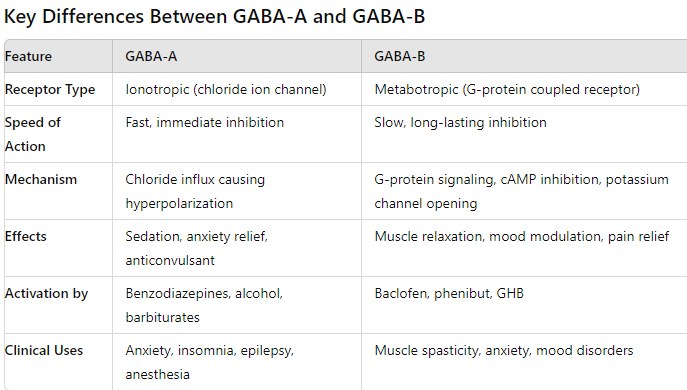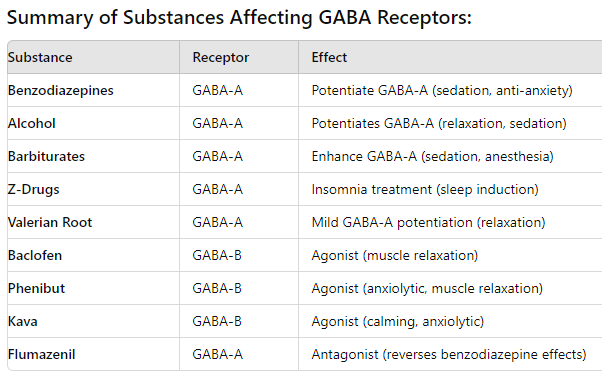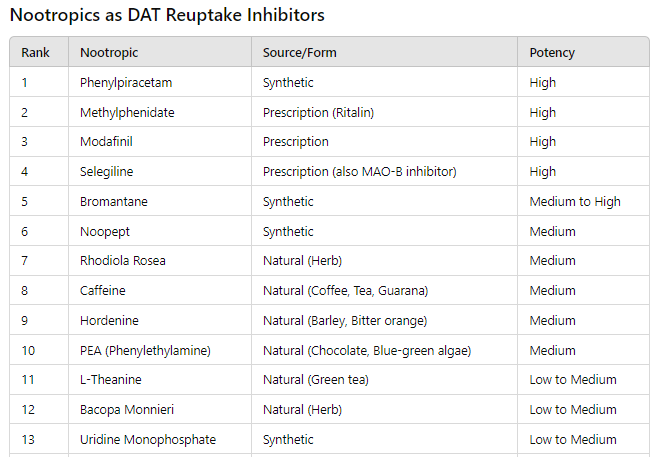Redefining differential roles of MAO-A in dopamine degradation and MAO-B in tonic GABA synthesis?
-
A little midfuck about MAO-B inhibitors...

It seems it is more about GABA than dopamine...
What do you think about it?Monoamine oxidase (MAO) is believed to mediate the degradation of monoamine neurotransmitters, including dopamine, in the brain. Between the two types of MAO, MAO-B has been believed to be involved in dopamine degradation, which supports the idea that the therapeutic efficacy of MAO-B inhibitors in Parkinson’s disease can be attributed to an increase in extracellular dopamine concentration. However, this belief has been controversial. Here, by utilizing in vivo phasic and basal electrochemical monitoring of extracellular dopamine with fast-scan cyclic voltammetry and multiple-cyclic square wave voltammetry and ex vivo fluorescence imaging of dopamine with GRABDA2m, we demonstrate that MAO-A, but not MAO-B, mainly contributes to striatal dopamine degradation. In contrast, our whole-cell patch-clamp results demonstrated that MAO-B, but not MAO-A, was responsible for astrocytic GABA-mediated tonic inhibitory currents in the rat striatum. We conclude that, in contrast to the traditional belief, MAO-A and MAO-B have profoundly different roles: MAO-A regulates dopamine levels, whereas MAO-B controls tonic GABA levels.
https://www.ncbi.nlm.nih.gov/pmc/articles/PMC8333267/Second study
GABA is the major inhibitory transmitter in the brain and is released not only from a subset of neurons but also from glia. Although neuronal GABA is well known to be synthesized by glutamic acid decarboxylase (GAD), the source of glial GABA is unknown. After estimating the concentration of GABA in Bergmann glia to be around 5–10 mm by immunogold electron microscopy, we demonstrate that GABA production in glia requires MAOB, a key enzyme in the putrescine degradation pathway. In cultured cerebellar glia, both Ca2+-induced and tonic GABA release are significantly reduced by both gene silencing of MAOB and the MAOB inhibitor selegiline. In the cerebellum and striatum of adult mice, general gene silencing, knock out of MAOB or selegiline treatment resulted in elimination of tonic GABA currents recorded from granule neurons and medium spiny neurons. Glial-specific rescue of MAOB resulted in complete rescue of tonic GABA currents. Our results identify MAOB as a key synthesizing enzyme of glial GABA, which is released via bestrophin 1 (Best1) channel to mediate tonic inhibition in the brain.
https://www.ncbi.nlm.nih.gov/pmc/articles/PMC4259537/BTW
High throughput Screening to Identify Natural Human Monoamine Oxidase B Inhibitors
Of the 905 natural extracts tested, the lowest IC50s [<0.07 mg/ml] were obtained with extracts of Amur Corktree (Phellodendron amurense), Bakuchi Seed(Cyamopsis psoralioides), Licorice Root (Glycyrrhiza glabra/uralensis), Babchi (Psoralea corylifolia seed). The data also show, albeit to a lesser extent, inhibitory properties of herbs originating from the mint family (Lamiaceae) and Turmeric, Comfrey, Bringraj, Skullcap, Kava-kava, Wild Indigo, Gentian and Green Tea. In conclusion, the data reflect relative potency information by rank of commonly used herbs and plants that contain human MAO-B inhibitory properties in their natural form.
https://www.ncbi.nlm.nih.gov/pmc/articles/PMC3521852/ -
More indirect evidence:
A natural MAO-B inhibitor eugenol also inhibits GABA-A- Eugenol Inhibits the GABAA Current in Trigeminal Ganglion Neurons
- Pharmacological Properties and Health Benefits of Eugenol: A Comprehensive Review
In practical terms:
- Ashwagandha enhances GABA-A
- Emodin (Cascara) and eugenol are MAO-B inhibitors...
- L-Theanine work on GABA-B
According to ChatGPT


-
Just looking at that chart that lists the effects of GABA I can't imagine why anybody would want that as a default state. Literally the Prince Valium phenotype.
Give me the opposite of that.
-
@Crypt-Keeper Hey, GABA should have a delicate (seesaw) balance with dopamine.
You can raise dopamine (and lower GABA) with L-Tyrosine, white coffee, OJ, and B vitamins like B1/sulbutiamine and B6-P5P, or Aspirin or T3/DHT.
Also with emodin, inosine, Tribulus Terrestris or
